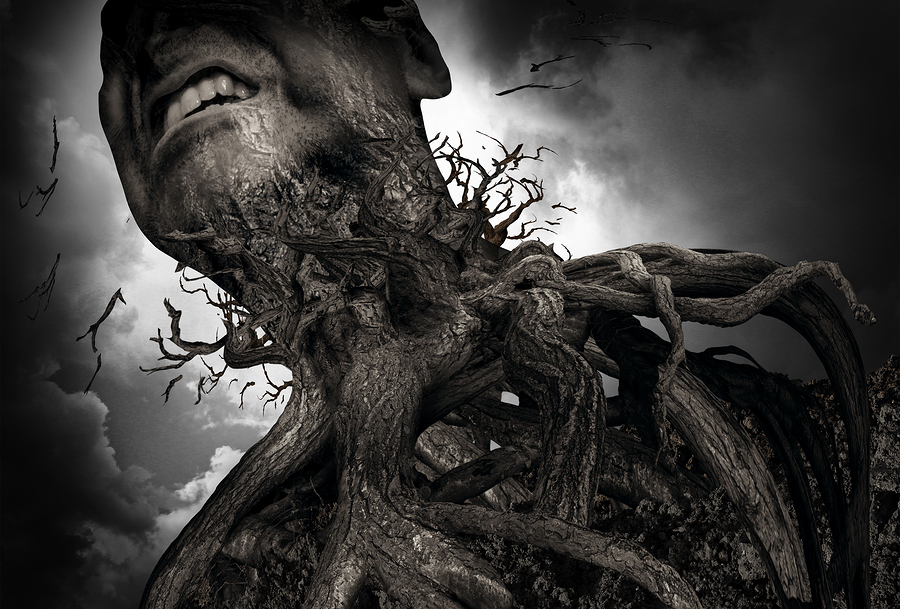
In 1990, the renowned depth psychologist and author Thomas Moore published a book entitled Dark Eros: The imagination of sadism. In this book, Moore offers a series of extraordinary insights into the deeper aspects of sadism that regard our darker nature as a reflection of the soul. It is this relationship between sadism and nature that I’d like to ponder here.
Moore proposes that there is a difficult necessity we encounter in our own impulses to be agents of cruelty, corruption, domination, and torture. Moore focuses on the writings of the Marquis de Sade as a mythography of the soul rather than as obscene social commentary. In this way, the images of sadism evoke some of the more disturbing repugnant aspects of the psyche’s underworld, linking the writings of the Marquis to ancient mythic images of torture and dismemberment and to the shock and horror of our personal nightmares.
For those familiar with Jung’s writings about the human shadow and the urgency of developing an ethical attitude toward the darker aspects of our own nature, Moore’s book persuasively elaborates this established concept. Adopting the term sadeian to refer to the Marquis’ habits as a mode or style of ensouled expression, he calls upon us to take account and responsibility for those places within our imagination where our own sadeian fantasies reside. He moves the sadistic aspects of our own nature beyond conventional ideas of pathology and towards pathos (suffering) as a form of soul-making.
As I contemplate the relationship we humans have negotiated with the planet, this shadowy aspect of our collective sadism seems quite apparent. Certainly the images of strip mining, slashing the rain forests, dumping barges filled with garbage into the oceans all seem readily available for sadeian commentary.
Perhaps we are at our most sadistic when we are at our most unconscious, denying the perverse and repugnant cruelty of our collective actions against the planet. First denial, and then rationalization, two common defense mechanisms that regularly appear in the therapy room, also serve as the preferred mechanisms to permit and justify the torture and corruption of the planet. If we re-imagine the Earth as one of de Sade’s literary protagonists, the victimized damsel Justine for example, the libertine zeal of our collective insistence to strip, cut, penetrate, immobilize, neutralize, slash, burn, seize, corrupt and devastate quickly comes into focus.
What is important at this moment in history is not so much to place blame or to vent our indignation and collective guilt over these grim facts. Certainly any actions that slow or even reverse the destructive processes currently in motion are welcome and needed. But the psychological dimension of our relationship with the planet is what I wish to emphasize.
The term Eco-sadism seems especially appropriate, given Moore’s insights into sadism’s relationship with the soul. There is a necessity that appears to us in our dreams, as well as in the great myths of various world traditions, which suggests the soul has a special relationship with suffering and torment. Consider the nightmare settings of subterranean chambers and dungeons, the torturous acts of skinning, flaying, hanging and the repugnant stench and filth that are so common to our darkest troubling dreams. When we reflect on the horrors we are inflicting upon the planet, depth psychology invites us to move beyond conventional tropes of self recrimination and notice the imagination of the psyche as the originator of grand guignol, grotesquerie, and gothic perversions.
In the case of eco-sadism, we are unconsciously acting out these cruel scenarios as a literal devastation of the planet. What seems key here is that the enactment is largely unconscious. The sadeian images of the soul that are being literalized as the rape and destruction of the planet usually hide behind those defense mechanisms of denial and rationalization, so we are able to reject outright the naked cruelty of what we are doing.
The Global Dream Initiative™ invites a different collective response. Let us acknowledge that we are frequently the unconscious agents of the Earth’s suffering. Let us turn to the images of our dreams to recollect what is dark and destructive in our own nature, and let us tend those images as a personal deep ethical calling.
Stephen Aizenstat has demonstrated through Dream Tending that when we tend the living images of the cruel and horrific, which first appear to us in the form of nightmares, there are surprising gifts and perspectives hidden behind the initial shock and disgust that come with their appearance. It takes time and a careful process of grounding ourselves, finding the support of allies, and allowing the images to gradually reveal their deeper nature, before an image of the soul’s suffering can transform through relationship into revelation.
What might be revealed if we were to become conscious of our eco-sadism and notice the soul images that are being converted into literal acts of brutality and destruction around the world? Once we become conscious of the psychological connection between the devastation of the planet and the torturous sadeian images of our own nightmares, an opportunity becomes available to engage the imagination in a contemplative exploration of how the root images of eco-sadism might transform through tending them as living images rather than literally enacting them.
Dr. Douglas Thomas has a private Jungian based psychotherapy practice in Pasadena and he teaches as adjunct faculty at Pacifica Graduate Institute in Carpinteria, California. He has presented workshops and talks throughout the state of California on LGBTQ issues and on dream therapy, his two areas of specialization. Dr. Thomas holds a masters degree from the USC School of Social Work, and a PhD in Depth Psychology with an emphasis in psychotherapy from Pacifica Graduate Institute. Over the past decade he has studied and refined Steven Aizenstat’s method of Dream Tending through ongoing training and collaboration with its creator in workshops, seminars, and retreats.
View a short video interview with Dr. Douglas Thomas on Dream Tending and the Global Dream Initiative
